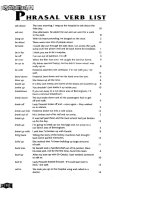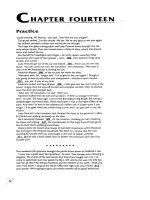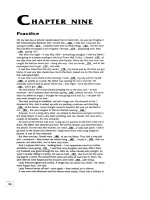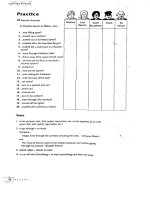Linguistics Pragmatics Language in Context
Bạn đang xem bản rút gọn của tài liệu. Xem và tải ngay bản đầy đủ của tài liệu tại đây (209.69 KB, 36 trang )
Linguistics
Pragmatics
Language in Context
Sentences
• In our initial discussion of meaning we
concentrated on two types of semantics:
– Lexical semantics: what individual words
mean
– Compositional semantics: how the
meanings of larger objects are constructed
out of the meaning of the parts
• Remember that one idea was that a key
part of understanding meaning involved
determining the truth conditions for a
sentence
Pragmatics
• How to use language in contexts?
• Again, we will see how structural issues
arise in the use of language?
Context Matters
NJ Transit scope ambiguity:
All the doors won't open
Two scenarios, two readings:
1) Everyone has to move to the front
because the back carriage doesn't line up
with the train.
2) A mechanical failure where all the doors
are jammed
Both readings are possible, but the context
favors picks one out
What is said and what is meant
• A discussion:
Oscar: How's Bert doing in his new job?
Ernie: He's making friends and he hasn't been
to prison yet.
• What is Ernie trying to convey that's not
in the text?
Pragmatics: Basic
Distinctions
• One of the starting points for
pragmatics is the idea that people
use language to accomplish
different types of acts
• These acts-- which are called
speech acts-- come in many
different varieties, depending on
what particular act is accomplished
Speech Acts
• Different types of speech acts:
–
–
–
–
Asking for something
Promising to do something
Threatening to do something
Ordering someone to do something
• Note that language is not the only
means by which these acts can be
accomplished
Direct vs. Indirect
• A basic distinction:
– Direct Speech Acts: The meaning
is more or less encoded in the literal
meaning of the utterance
– Indirect Speech Acts: The meaning
that is relevant is the speech act
meaning, not simply the literal
meaning
Direct Speech Acts
• Types of Direct Speech Act, along
with sentence type:
Type
Assertion
Question
Order
Function
Sentence
convey meaning declarative
John got an A on the test.
elicit information interrogative
Did John get an A on the test?
affect others’ actions imperative
Get an A on the test!
Indirect Speech Acts
• Let’s consider a simple question:
Will the train be on time?
• An answer (e.g. “yes”) would give the
information that the person asking the
question is looking for
• But consider:
Do you know if the train will be on time?
• An answer “Yes, I know” here would be more or
less annoying; in the typical case, this is not a
question about the listener’s knowledge, but is
instead asking for the same information as the
first. But indirectly….
Grice: Cooperation in
conversation
• H.P Grice's research involves
understanding how speaker’s
meaning- what a person uses the
sentence to mean- arises from
sentence meaning- the literal form
and meaning of the sentence
• He developed a “grammar” of
appropriateness.
Basic Principles
• Grice’s program involves
understanding basic principles that
get conversations going
• Cooperative principle: "Make your
contribution to the conversation such as is
required, at the stage at which it occurs, by
the accepted purpose or direction of the
exchange in which you are engaged."
Cooperative Principle
• A non-linguistic example:
• Ernie is baking and asks “Do you have a
cup of sugar?”
• Bert passes him a cup of salt.
• This is uncooperative.
Specifics: Maxims
• Grice’s analysis involves specific
maxims that speakers follow in
respecting them
• The idea is that if speakers assume
the maxims to be operative, then
they can determine from what was
literally said what the speaker’s
meaning is
The Maxims
• Quality: (tell the truth)
– Don’t say what you know to be false
– Don’t say things that you lack evidence
for
• Quantity: (say as much as is necessary)
– Make the contribution as informative
as the
circumstances demand
– Don’t be more informative than
required
The Nature of the Maxims
• Although the maxims have the form of
instructions, they are not
• Rather, they are observations--heuristic in
nature--that encode the assumptions that
speakers are using in actual discourse
situations
– This is no different from the study of other
general principles in language
– Consequently, one may wish to investigate their
broader dimensions: What happens to the brain
when these principles are violated? How do
children learn these, or are they learned at all?
Conversational Implicature
• Flouting a maxim provides information as
well. In this way Grice's work explains
why we can say the vague things we do
and still be understood.
• We can see how people follow these
maxims to deduce speaker’s meaning in
simple examples
Be Brief
Compare:
1) Miss Piggy sang Rainbow Connection
2) Miss Piggy produced a series of
sounds that corresponded closely with
the score of Rainbow Connection.
Be Relevant
• Consider another example; this one is a
letter of recommendation:
Dear Admissions Committee:
I am pleased to write on behalf of John Smith,
who is applying to your program. Smith has
excellent handwriting and is typically clean,
and his kids are very cute.
Sincerely,
Professor Throckmorton W. Bullfinch
• A reader of this letter would understand
this to be the best that Prof. Bullfinch can
Be specific
• Finger or thumb?
• Square or rectangle?
• Compare: thought-thinked
Implicatures
• Notice that what is implied in these
cases is still somewhat weak. We can
cancel implicatures:
• Bert spent some of the summer in
prison.
• In fact, Bert spent all of the summer in
prison.
Speaker beliefs and Common
Ground
• The 'happy' use of implicature requires some
common understanding between speakers.
– Some sort of mind-reading in effect
• Speakers build and test the common ground in
various ways.
• In fact, whether or not some sentences can even
be evaluated depends on the existence of certain
facts in the common ground.
Speaker bias & Common Ground
• At an interview, Bert might get asked either:
• 1) Are you a communist?
• 2) You're a communist? (rising intonation)
• The second form displays speaker bias.
– The speaker believes that Bert is a communist
but it is not in the common ground.
Presuppositions
• Some words have conditions on the common
ground that need to be fulfilled before we can
even think about what they mean.
• The has a uniqueness condition. When you
say the muppet, there is a presupposition
that you are referring to a particular muppet.
Presupposition Accommodation
• It was Cookie monster who ate the cookie.
• Presupposition: Someone ate the cookie.
• This imposes a condition onto the common ground.
However, even if no one previous mentioned the
eating of the cookie, the dialog will probably continue.
• The presupposition will be accommodated into the
hearer's beliefs and the common ground.









